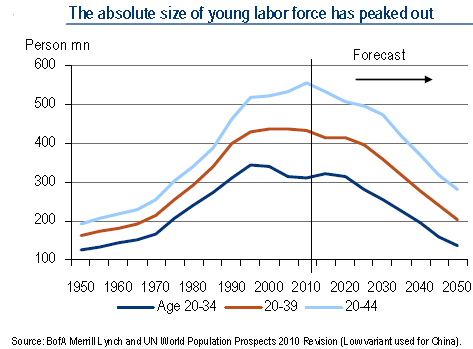Rumors have been circulating for some time in the media that China is considering scrapping the one-child policy that was launched back in 1979. But the nation's official paper suggested last week that although plans to change the policy are being developed, it may be some time before changes are in fact implemented.
Xinhua - The National Health and Family Planning Commission moved on Tuesday to allay concerns in media reports last week that China will relax its family planning policy by 2015 to allow more couples to have two children.This statement was followed by the another comment on Friday:
The commission said no timetable has yet been determined and instead said the new plan will be carried out "at the proper time".
The commission, however, did confirm media reports that an update is on its way. In the new plan, couples will be allowed to have a second child if at least one parent has no siblings.
Xinhua: - China will gradually improve the country's population policy in accordance with its actual conditions, a spokesman for the country's family planning authority said Friday.The government is saying - don't rush it. But it will get done. What is driving the nation's authorities to all of a sudden reconsider a policy that has been in place for decades? Here are some factors that make the leadership's decision to ultimately abandon this law inevitable.
Adjustments to the existing policy will be made on the basis of ample research and survey results to adapt to "economic and social development as well as long-term and balanced population development," Deng Haihua, spokesman for the National Health and Family Planning Commission, told a regular press conference.
The commission will introduce adjustment plans to the family planning policy "at an appropriate time," he said, citing a public health promotion plan released by the commission on Tuesday.
1. China's new government has an opportunity to implement some long-overdue structural changes, with family planning certainly being one of them. While other reforms may take longer, the one-child policy could be a relatively "safe" and even popular reform.
Merrill: - ... major structural reforms are unlikely to be carried out in China in 2013-14 as the incoming president Xi and premier Li will most likely take the first couple of years to consolidate their power base and make allies. But we believe terminating the one-child policy could be one of the few major reforms in 2013-14.2. China's middle class is becoming more affluent and somewhat more vocal. The inability to have more than one child (or paying penalties for more than one child) is one of the laws the middle class generally wants eliminated.
4. China is beginning to face labor shortages. With the number of young people in decline, growing the economy even at 7.5% could become a problem.
 |
| Source: Merrill |
Clearly increasing birth rates at this stage is not going to solve the issue. But leaving the regulation in place will certainly not be helpful either.
5. Related to #4 above, at current pace China will face the same scary inverted population pyramid that is certain to hit Japan. At current rate, China's median age will in fact exceed that of Japan before 2050.
 |
| Source: Merrill |
Most developed economies will face this problem in one way or another, but China's situation could be particularly acute, as relatively few young people will be forced to support a massive older population. Again, reversing the one-child policy will not resolve this, but most are convinced that leaving the policy in place over time could certainly make the problem worse.
 |
| Source: Merrill |
SoberLook.comFrom our sponsor:












